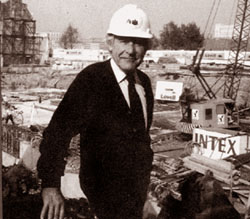Shakespeare in the theatre
The World of Arts by Gwen Herat
|

PIONEER: Sam Wanamaker who spent his fortune because of his
adoration to the works of Shakespeare to build the new Globe theatre
but unfortunately never lived to see its completion. Wanamaker is
seen at the construction site of the Globe.
|
DRAMA: There were actors before any theatre sprang up and they
used to perform at market places, inn-yards and in the open. These were
the only places where they could attract people and earn some money.
Then, for the dawn of the theatre, there appeared an Elizabethan
promoter of performing arts in the guise of James Barbage, (1530-97) who
after careful deliberation and assessment of the prevailing touring
troupes, decided to help and finance a permanent theatre for the actors.
On the night of 28 December, 1598 they built the first Globe Theatre
which was open to the skies. This appealed to the audience who responded
magnificently where the Barbage brothers were able to recover their
investments. However, in 1623, the Globe burnt down mysteriously. The
Globe had proved its worth.
Later in the 17th century the Bard gave the impression of writing his
work without knowing why. At least, that is what the critics assumed.
But one thing stood out loud and clear that the theatre would never have
survived without Shakespeare. He was there to guide and develop the
theatre but their enemies got the upper hand that forced the theatres to
close down and given the time, the theatre was back in glory.
The Old Vic
In the centre of Waterloo Road and to the south of Thames, the Old
Vic was built in 1818 at the Royal Coburg. Renamed the Royal Victoria,
it had a turbulent early history.
By the Autumn of 1823, every play in the First Folio had been
performed by popular actors. From 1823, a new director, Harcourt
Williams engaged young George Gielgud as the leading man in the next two
years.
As the theatre became established in the 1930s, great names like
Charles Laughton, Flora Robson, Michael Redgrave, etc gave life to major
characters. The Waterloo Road Theatre re-opened under Hunt in November
1942. In 1963 the New National Theatre company under Sir Lawrence
Olivier yet without a building of its own, took over the VIC and opened
with Hamlet. In 1975 the National Theatre left for its new theatre for
the Old Vic.
For nearly 13 years the National Theatre remained with the Old Vic
until the completion of their own theatre in 1963. It was sited at the
South Bank. Despite the protracted delay each of the three theatres
within the National became active. A Theatre Board was set up in 1962 to
overlook the building of the main Theatre.
Lord Oliver was the Director from 1962-1973 and Sir Peter Hall took
over from him until 1988. There were many who succeeded him, thereafter.
It gained Royal Charter in 1988.
Midsummer Night's Dream was the first play to go. It was initiated by
the Australian actor, Sydney Carrol in 1932. Carrol reshaped the stage
and transplanted trees. The first season drew an audience of over
250,000 but lost over a thousand pounds. Carrol successfully sought
funds from the Arts Council. A year later the company went on its first
overseas tour.
Director, Michael Bogdanove and actor, Michael Pennington established
the ESC in 1986. The inaugural performance of all the Henrys were toured
throughout the world and the company added four more new productions.
Over the next six years, the company performed 15 plays. The ESC
pioneering educational and community work still continue, supported by
the Arts Council.
The Globe
This is the better known among all theatres. The original Globe
Theatre opened in 1599 was at Southwalk on the South Bank of the Thames
where Shakespeare had major shares. It had as its first performance, As
You Like It in 1613.
It mysteriously brunt down during a performance of Henry III and
re-opened in 1614. Described as 'the fairest that ever there was in
England' was pulled down 30 years later by the Puritants.
Hollywood actor, director, the late Sam Wanamaker who was a devotee
of Shakespeare was determined to rebuild the Globe as a dedication to
the Bard. He sought the original site of the old Globe.
He was surprised to find that locals knew very little about it. After
much trouble to locate the place, Wanamaker came across and old plaque
which he cleaned up and located the original site of he old Globe.
He got about building the present Globe with such passion and
dedication, he was personally on the site to see to its finish. But
tragically, he could see his dream materialising because he died before
its completion. A line from King Henry III remains as a fitting tribute
to this great philanthropist for his magnificent efforts. 'Our
children's children will see this and bless heaven'.
The mere coincidence of names to a local journalist, Tom Patterson
and the possibility of an annual Shakespeare Festival in The Canadian
Stratford, a small Ontario town by the Canadian Avon. During the summer
of 1953, Sir Alec Guiness acted Richard III and a few months later,
Irene Worth in All's Well That Ends Well.
Inspite of several alternations, the state remains basically
Moiseiwisch-Guthrie creation. During its 27 years, Stratford worked
through Shakespeare Folio. Largely, they were all responsible for the
popularising Shakespeare in Canada and it was all due to the dedicated
efforts of Tyronne Guthrie. |

